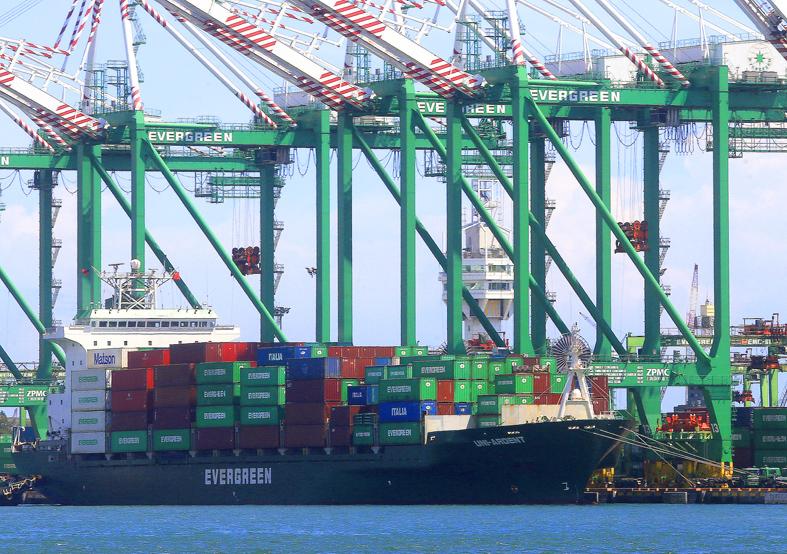Taiwan ranked 15th in the world by export value last year at US$345.21 billion, gaining two places from a year earlier amid its strongest performance in 16 years, the Ministry of Finance said on Thursday, citing WTO data.
The improvement came after exports grew 4.9 percent annually and imports rose 0.3 percent, bucking the world’s more than 7 percent decline in exports and imports, the ministry said.
Global exports were US$17.6 trillion and imports were US$17.8 trillion, shrinking 7.6 percent to the weakest in four years, as many parts of the world locked down amid the COVID-19 pandemic, which also hampered trade flows.

Photo: CNA
Taiwanese tech firms benefitted from the surge in demand for laptops, tablets, TVs and other devices used in remote working and schooling, as well as for emerging technologies such as 5G smartphones, artificial intelligence and Internet of Things applications, the ministry said.
Taiwan accounted for 2 percent of the world’s overall exports and 1.6 percent of its imports, it said.
China topped the survey in exports and finished second in imports behind the US, as it has maintained a manufacturing edge and created added value, the ministry said.
China has since 2009 replaced Germany and the US as the world’s largest exporter, making up 14.7 percent of global outbound shipments last year, it said.
Germany was third in exports, followed by the Netherlands, Japan, Hong Kong and South Korea, it said.
Singapore was 14th, one place higher than in 2019.
The US is the world’s largest importer and second-largest exporter.
The pandemic affected the rankings, as economies that more effectively controlled the virus gained headway, the ministry said.
That could explain why Taiwan and Hong Kong moved up, while Spain and Russia saw their ranking sliding.
Taiwan brought COVID-19 largely under control in May last year, allowing local manufacturers to win order transfers from competitors in other countries.
Germany, Japan, Singapore, South Korea and the US all made smaller contributions to global exports last year.
The outlook remains bright for Taiwan’s exports, as most firms are confident output would increase over the next year, according to a survey released on Thursday by IHS Markit, an international research body.
“Many firms are hopeful the pandemic would come to an end and that customer demand would continue to thrive,” IHS Markit said, adding that the degree of optimism was at a near seven-year high.

The Central Election Commission has amended election and recall regulations to require elected office candidates to provide proof that they have no Chinese citizenship, a Cabinet report said. The commission on Oct. 29 last year revised the Measures for the Permission of Family-based Residence, Long-term Residence and Settlement of People from the Mainland Area in the Taiwan Area (大陸地區人民在台灣地區依親居留長期居留或定居許可辦法), the Executive Yuan said in a report it submitted to the legislature for review. The revision requires Chinese citizens applying for permanent residency to submit notarial documents showing that they have lost their Chinese household record and have renounced — or have never

A magnitude 5.6 earthquake struck off the coast of Yilan County at 12:37pm today, with clear shaking felt across much of northern Taiwan. There were no immediate reports of damage. The epicenter of the quake was 16.9km east-southeast of Yilan County Hall offshore at a depth of 66.8km, Central Weather Administration (CWA) data showed. The maximum intensity registered at a 4 in Yilan County’s Nanao Township (南澳) on Taiwan’s seven-tier scale. Other parts of Yilan, as well as certain areas of Hualien County, Taipei, New Taipei City, Taoyuan, Hsinchu County, Taichung and Miaoli County, recorded intensities of 3. Residents of Yilan County and Taipei received

Taiwan has secured another breakthrough in fruit exports, with jujubes, dragon fruit and lychees approved for shipment to the EU, the Ministry of Agriculture said yesterday. The Animal and Plant Health Inspection Agency on Thursday received formal notification of the approval from the EU, the ministry said, adding that the decision was expected to expand Taiwanese fruit producers’ access to high-end European markets. Taiwan exported 126 tonnes of lychees last year, valued at US$1.48 million, with Japan accounting for 102 tonnes. Other export destinations included New Zealand, Hong Kong, the US and Australia, ministry data showed. Jujube exports totaled 103 tonnes, valued at

BIG SPENDERS: Foreign investors bought the most Taiwan equities since 2005, signaling confidence that an AI boom would continue to benefit chipmakers Taiwan Semiconductor Manufacturing Co’s (TSMC, 台積電) market capitalization swelled to US$2 trillion for the first time following a 4.25 percent rally in its American depositary receipts (ADR) overnight, putting the world’s biggest contract chipmaker sixth on the list of the world’s biggest companies by market capitalization, just behind Amazon.com Inc. The site CompaniesMarketcap.com ranked TSMC ahead of Saudi Aramco and Meta Platforms Inc. The Taiwanese company’s ADRs on Tuesday surged to US$385.75 on the New York Stock Exchange, as strong demand for artificial intelligence (AI) applications led to chip supply constraints and boost revenue growth to record-breaking levels. Each TSMC ADR represents